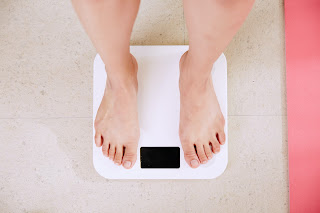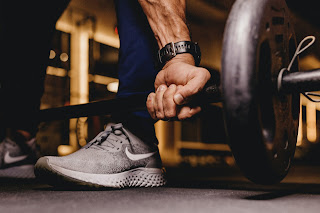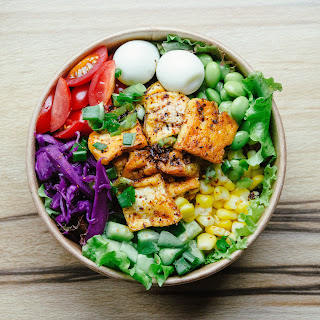The diet industry has told us that any weight gain is bad, and we need to resort to drastic measures to keep the weight off. I’m looking at you, juice cleanses 🙄.
This blog post is going to explain how you gain weight and why it is not the end of the world.
If you want to lose weight because you feel that it is right for you, then of course that’s fine. My issue is that weight loss is pushed by celebrities and the media so much that it makes people think that being thin is the only purpose of life.
Your value isn’t determined by how thin you are, and resorting to drastic dieting measures sold by celebs isn’t the way to go.
How do you gain weight?
First, let’s explain how you gain weight.
Weight is gained by consuming more calories than your body needs. It could also be gained by a reduction in your physical activity levels while your calorie intake stays the same. To put it simply, it’s about your calories in being more than calories out. Some people may also experience bloating and ‘water weight’ but this isn’t actual weight gain and should go away on its own.
People usually see weight gain as a negative and think it’s unhealthy to gain weight, but this is not always true.
I am also a firm believer that you shouldn’t comment on people’s bodies whether they have gained or lost weight. I don’t think it is helpful and most people already know if their weight has changed. You don’t know how they feel about it, and comments about their weight could be harmful to them.
Let's get into why weight gain isn't always bad.
Weight doesn’t equal health:
Your weight doesn’t always reflect your health status which is why focusing on the scales isn’t particularly beneficial.
The number on the scale is your whole mass, that includes your muscles, bones, and fat. The number on the scale also changes during the day depending on how much you've eaten or drank, exercised, and gone to the loo.
Weight gain doesn’t show your body composition, as weight gained isn’t always fat. People may weigh more but it could be muscle that they're gaining. If you're doing resistance training exercises and consuming enough protein you will gain weight, but it is muscles forming. So, you could weigh more but it is muscle which is ‘healthier’ than fat.
There is also the fact that, if you're a lower weight, you may not necessarily be healthy. You could be deficient in some nutrients, lacking muscle mass or have an ongoing health problem. You could also be a larger weight and still be deficient in certain nutrients. The number on the scale doesn’t reflect your health, there is so much more to health than just weight.
Yes, having excessive body fat can lead to obesity which can increase the risk of cardiovascular diseases. But having a bit of weight gain doesn’t mean you're obese or at risk of those diseases.
Looking at weight in isolation isn’t helpful when it comes to determining health. As dietitians, with patients in the hospital we would consider a host of factors like blood test results and a patients’ psychological wellbeing when trying to improve their health. Weight loss isn’t always the answer.
Weight loss through dieting is a short term fix:
I have a whole blog post about why diets don’t work, but in case you missed it, trying to induce weight loss through a quick fix diet isn’t going to work. Click here to read the post. But in summary, any weight you lose during the diet will come back on when you go back to your normal way of eating. It can even mean you gain more weight back than you lost.
Also, focusing on the scales and weighing yourself often could even lead to more weight gain. This is because seeing that your weight has increased or stayed the same may discourage you and you may ‘give up’ and eat whatever you want. But weight fluctuations are completely normal and to be expected.
If you want to lose weight in a more sustainable way then a few things to incorporate into your lifestyle are:
- Increase vegetable consumption at meals – vegetables are low in calories but high in fibre so fill you up. Aiming for half a plate of veg is a good way to go.
- Try to include protein at every meal to keep you full and satisfied – this can be meat, eggs, dairy, beans/legumes or fish. Protein takes longer to digest which is how it keeps you feeling full - it stays in your digestive system for longer.
- Try to reduce your intake of high sugar/high fat foods – don’t completely exclude them but enjoy in moderation as these tend to be high in calories and can be easy to overeat.
Health at every size:
We probably all have different ideas of health, and what being healthy means. I like to think of health as a state of physical and mental wellbeing. And you can be healthy at any size, i.e, be free from physical or mental disease.
I think we should shift the focus from dieting just to lose weight, to eating healthily and enjoying exercise because we notice how much better it makes us feel. Regardless of your size, having these healthy habits can help you live longer.
Food should be enjoyed and celebrated. Exercise shouldn’t feel like a punishment to avoid weight gain. Your body should be appreciated for what it can do not the fact that it’s the thinnest.
Again, if you want to lose weight because you feel it is right for you, that’s fine. But society has drummed it into us that we need to lose weight at any cost. This is not the case and your body weight is not tied to your worth.
Key Points:
- Weight is gained by having an excess of calories (energy)
- Weight gain isn't a bad thing as the number on the scale doesn't tell you your muscle mass, and is affected by things like going to the toilet
- Your weight doesn't show you how healthy you are. You can have a lower body weight and be unhealthy just as you can be in a bigger body and be unhealthy
- Going on a crash diet to lose weight usually ends in weight regain
- Seeing health as a state of physical and mental wellbeing tells us that you can be healthy at any size
Also, I’m going to be going on placement soon. I’m excited but nervous. It will be very different to how it normally is due to all the COVID restrictions and I’m not sure if we’ll have any face to face patient contact. I plan to write some blog posts about my placement experience and the life of a student dietitian on placement. I hope I can give you some insight into the world of dietetics!
I'd love to hear thoughts on this below.
Bye for now! 👋
References:
How do you gain weight: https://www.ncbi.nlm.nih.gov/pmc/articles/PMC6481299/ and https://pubmed.ncbi.nlm.nih.gov/27739007/
Weight doesn’t equal health: https://pubmed.ncbi.nlm.nih.gov/30115550/ and https://pubmed.ncbi.nlm.nih.gov/18695655/ and https://pubmed.ncbi.nlm.nih.gov/31852605/ and https://pubmed.ncbi.nlm.nih.gov/30829532/
Dieting leads to weight gain: https://www.ncbi.nlm.nih.gov/pmc/articles/PMC6061963/ and https://pubmed.ncbi.nlm.nih.gov/25614200/
Health at every size: https://www.ncbi.nlm.nih.gov/pmc/articles/PMC1681635/ and https://pubmed.ncbi.nlm.nih.gov/27378611/
Healthy habits help you live longer: https://pubmed.ncbi.nlm.nih.gov/22218619/



.jpg)


.jpg)

Comments
Post a Comment